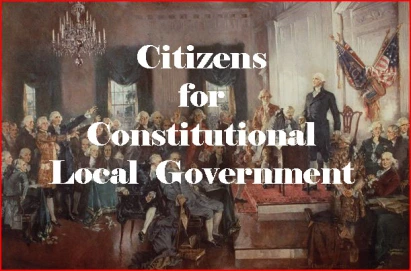In its amicus brief in the NJ Supreme Court Dublirer case [1] involving free speech in an HOA election campaign, CAI clearly makes the point that HOAs are not subject to constitutional protections and elections processes are covered solely by the HOA governing documents.
These rights of members do not arise from the State Constitution but rather from statutes, contract, the association’s and governing board’s fiduciary duties, public policy and fundamental fairness.
In light of these statutory, contractual and common law standards protecting the interests of community association members, they need not claim constitutional protection from the conduct of governing boards to exercise their rights with respect to the associations.
What CAI is saying is that the pro-HOA statutes that it helped write and the adhesion contracts executed under misrepresentation [2] supersede the protections of constitutional law.
Furthermore, CAI attempts a strenuous argument of “the sky is falling” if free speech was allowed in private HOA communities, which would doom the essential private nature of HOAs.
CAI-NJ’s concern is the attempt to convert private communities into constitutional actors and to open such communities to access not only to speakers from within the community but also to the public, while ignoring contractual agreements and non-constitutional protections.
This case did not deal with outside speakers, but a member running for office and seeking equal access to the membership. CAI then raises another of its favorite “cause celebres” — HOAs are businesses. Read this fantastic argument:
The relationship between the plaintiff and the defendants here is that of a business corporation and so is similar to that involved in any other business corporation. A shareholder who wishes to run for a position on a corporate board has no right to post campaign signs on the corporation’s property. Moreover, if such a shareholder wishes to distribute campaign literature to the other shareholders before the issuance of the corporation’s annual meeting announcement and proxy, such shareholder must do so at his own expense. Dublirer’s position vis a vis the cooperative here is no different. He has no constitutional right to distribute his campaign materials within the cooperative’s property simply because mailing them to the other tenant/shareholders may cost him money”.
This in the trenches argument stands in stark contrast to CAI’s propaganda statements made for public consumption that HOAs are democratic and represent the best town hall democracy in America. If HOAs are businesses, why is the term ‘community” used rather than “cooperative”? For example, like “building vibrant, harmonious, competent cooperatives.”
And finally, CAI makes its last ditch appeal that there are other non-constitutional protections for HOA members so the court need not introduce the Constitution into HOA-Land. Let them remain independent principalities where hired-hand stakeholders like CAI can control and dominate.
This is CAI’s most fearful event of all, that the courts will hold HOAs as constitutional actors or state entities and subject HOAs to the 14th Amendment protections. This state of affairs would be the death knell not of HOAs, but of the need for CAI itself. And CAI well knows and fears this eventual outcome.
These views by CAI before the courts and not propaganda for public consumption must be made known to the media and to all state legislatures and legislators. Then the legislators must be asked where they stand? Behind the Constitution or behind CAI?
Notes
- “BRIEF OF PUTATIVE AMICUS CURIAE COMMUNITY ASSOCIATIONS INSTITUTE – NEW JERSEY CHAPTER,” Michael S. Karpoff, Jan. 3, 2013 (Dublirer v. 2000 Linwood Avenue Owners Assn, N.J. Docket 069154 (2014)).
- Misrepresentation: CAI comes with unclean hands.

Do you have any recommendations on how to best approach state legislators with this information?